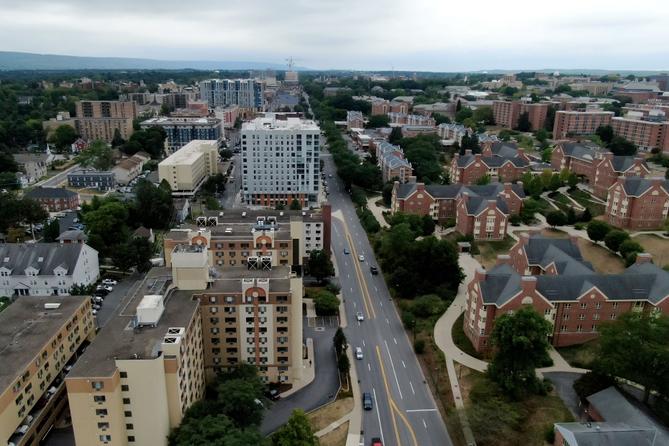This story was produced by the State College regional bureau of Spotlight PA, an independent, nonpartisan newsroom dedicated to investigative and public-service journalism for Pennsylvania. Sign up for our regional newsletter, Talk of the Town.
STATE COLLEGE — In the past decade, a handful of 12-story luxury student housing high-rises have cropped up in downtown State College, dramatically changing the skyline of the small borough that’s home to massive Penn State University.
For some residents and university alumni, the buildings are an unwelcome sight, altering the character of downtown and portending more unwanted development. Others appreciate the higher-density housing, saying it supports a more sustainable and livable downtown.
High-rise student apartment buildings have been a subject of contention for some time. While a zoning ordinance amendment to discourage developers from building more of them has been proposed, it has also surfaced a larger issue of how zoning changes should be made — piecemeal or holistically.
And it has forced elected officials and the community to grapple with how what they want downtown to look like might differ from what the market can support.
“We keep losing sight of a vision through these changes, and without a clear understanding, I feel like the flip-flops are catching up with us,” State College Borough Council Member Deanna Behring said at a mid-September council meeting.
Since the last comprehensive zoning rewrite in 1959, more than 220 amendments have been made, State College planning director Ed LeClear told Spotlight PA.
The most recent zoning amendment under consideration would repeal a 2013 amendment — requested by the developers of The Metropolitan on Atherton Street — that reduced the required commercial space for high-rises and allowed more rental residential space in select “non-owner-occupied” bonus areas. Those NOO bonus areas were concentrated on the edges of downtown to preserve the historic core.
In 2017, the council removed the NOO bonus areas on the west side of downtown but left them in the east. The decision before the council at its Sept. 12 meeting — which they ultimately postponed making — was whether to eliminate the NOO bonus areas in the east as well, effectively deterring future high-rise student housing developments.
Since 2013, four 12-story high-rises dedicated to student housing have been built downtown, and another is on the way.
Community members who spoke during the meeting’s public hearing expressed concern about eliminating the higher-density housing.
“By putting this change into effect without a complete and comprehensive change to all zoning — all you’re doing, I’m afraid, is playing a game of whack-a-mole,” former Borough Council President Evan Myers said. “You’ll push down the building heights in one place, only to see a spate of mid-rise buildings pop up … and that will creep into neighborhoods and perhaps even destroy some of them.”
He also pointed out that the borough was able to incentivize developers to build green buildings, commercial space, and inclusionary housing by allowing higher-density projects.
Several council members agreed that a comprehensive zoning rewrite should be the priority, rather than rushing a zoning amendment that could have unintended consequences.
For Council Member Gopal Balachandran, the high-rises and density aren’t an issue. But he is concerned with the lack of transparency surrounding ownership of the student housing developments.
Council Member Peter Marshall opposes waiting for a comprehensive rewrite to deal with the student high-rises because he doesn’t want to see any more built downtown.
“That’s certainly going to change the downtown, it’s already started,” Marshall said. “It will be strictly a student downtown, and that’s unfortunate because we have a lot of nonstudents that live in this town and have for years. And they don’t like what they see.”
Should the council eventually decide to repeal the 2013 amendment, 12-story buildings could still be built — but projects would have to include at least 40% commercial space. Residential density would also be lower.
Under current rules a 12-story building in an NOO bonus area can have roughly 10 stories of residential space. If the 2013 amendment is repealed, a 12-story building could probably have about six floors of residential space, LeClear said, noting that is a ballpark figure.
An example of this type of development is the Fraser Centre, which has owner-occupied condos, a hotel, stores, and eateries.
“There’s not going to be as much interest from the market to build at that lower residential density and also have to build at least 40% of the project as commercial space,” LeClear said.
The market wants to build student housing, he said, and not just because of State College’s zoning. “This is happening in college towns all over the country,” he said, “where there’s a whole industry that’s really focused on building student housing in order to essentially make an investment opportunity.”
Members of the Borough Council, the Planning Commission, and the Zoning Revision Advisory Committee have indicated preferences for shorter buildings, less density, more affordability, greater energy efficiency, and more expensive construction types, he said.
Those plans differ from the priorities of developers, however. So planning staff is in the process of trying to “reality check (officials) to the market,” LeClear said, while figuring out what trade-offs could be made to encourage developers to build what they want, where they want it.
He hopes that a draft of the comprehensive zoning rewrite, which has been in the works for several years, can be ready in 2023.
“It’s a matter of figuring out what we want to keep,” he said, “but then also preparing us for where we want to go in the future — and also not creating code that just reacts to the situation right now.”
SUPPORT THIS JOURNALISM and help us reinvigorate local news in north-central Pennsylvania at spotlightpa.org/statecollege. Spotlight PA is funded by foundations and readers like you who are committed to accountability and public-service journalism that gets results.
